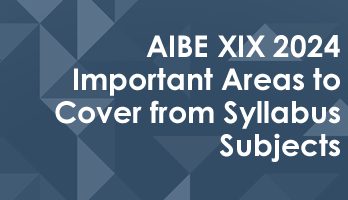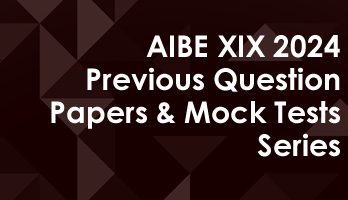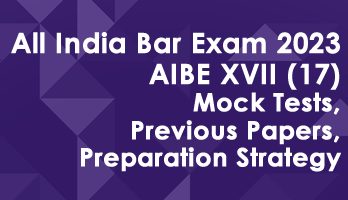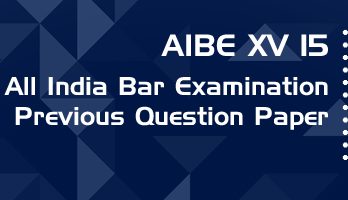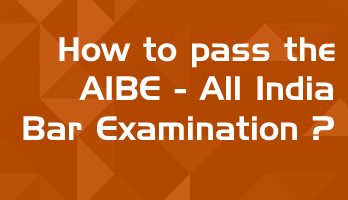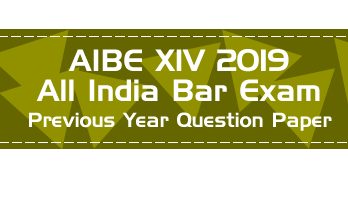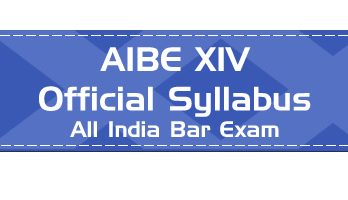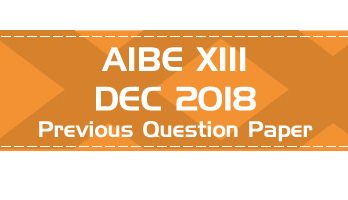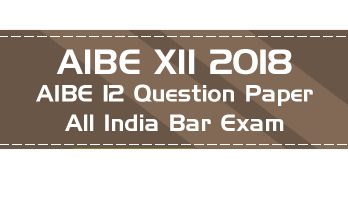This series consists of seven articles, which expand the complete syllabus for the AIBE – All India Bar Exam.
1. Constitutional Law, IPC, CrPC – Part 1
2. Code of Civil Procedure, Evidence Act, ADR – Part 2
3. Family Law, PIL, Administrative Law – Part 3
4. Professional Ethics, Company Law, Environmental Law – Part 4
5. Cyber Law, Labour & Industrial Law, Law of Torts – Part 5
6. Taxation Laws, Contract Law, Negotiable Instruments, Property Law – Part 6
7. Land Acquisition Act, Intellectual Property Laws – Part 7
- Updated as per the latest AIBE Syllabus & Pattern
- 15 AIBE Previous Question papers - AIBE IV to XVIII
- 15 Full-length mock tests as per latest pattern
- All Questions with Answers and Explanations
- Access valid for one year from date of purchase
- Accessible 24 x 7 via Smart-Phone, Tablets and Desktops
- Free Sample Mock Test - Try Before You Buy
Authentic Feedback from previous LawMint users :
I got AIR 21 in CLAT PG. Thank you so much. Your mocks helped me a lot in my preparation 🙂 - Ayushi Jain
I have subscribed to your CLAT PG program and got AIR 36 in this year CLAT PG. I have also secured AIR 54 in AILET PG exam. I would like to thank you. Your mock paper really helps a lot - Shrashank Tripathi
I would like to thank you for the CLAT PG LLM COURSE. Practising mock tests there helped me in getting confidence and hence I was able to get AIR 45 in CLAT PG LLM - Akshay Awasthi
A year back, I relied on the IIT Kharagpur RGSOIPL mock test series by LawMint to prepare for my RGSOIPL entrance test. Few months back, I relied on your UGC NET Law series to prepare for UGC NET. I was the topper of the RGSOIPL entrance, and have cracked JRF in UGC NET. All thanks to LawMint - Anshuman Sahoo
"I got AIR 18 in CLAT PG and General Category rank 28 in AILET PG. I want to thank you for helping me practice well in controlled conditions from any place. It gave me a lot of confidence and I took the tests while travelling too. I also made it to IIT Kharagpur." - Vinodharani
"Lawmint has been of great help to me in securing AIR 25 in AILET PG and AIR 29 in CLAT PG examinations. The subjective and objective approach of the test series kept me up to date with the latest exam pattern." - Bhawna Nanda
"I, Nimmy Saira Zachariah joined you clat test series. I cleared AILET PG with 30th rank. Your test series were of immense help as it gave me clear idea of where my preparations stand thank you once again law mint." - Nimmy S Z
"Hey guys. Where do I start? If I thought that getting AIR 59 in Clat PG was it, then how wrong I was. With Lawmint now I have cracked UGC NET as well." - Joyanta Chakraborty
Constitutional Law – 10 questions
The purpose of this course is to acquaint the students with the Basic Postulates of the Constitution like the Constitutional Supremacy, Rule of law, and Concept of Liberty. Give them a picture of Constitutional Parameters regarding the organization, Powers and Functions of the various Organs of the Government.
The emphasis is also on the study of the nature of federal structure and it’s functioning. A critical analysis of the significant judicial decisions is offered to highlight judicial restraint, judicial passivity, judicial activism and judicial balancing. Finally, the students should be able to articulate their independent views over contemporary crucial constitutional issues.
Topics Covered :
- Salient Features of the Indian Constitution, Preamble, Citizenship, Fundamental Rights.
- Directive Principles of State Policy, Fundamental Duties, Parliamentary Government, Bicameralism, Legislative Process, Privileges, Council of Ministers, President of India, Governor.
- Judicial process under the Constitution, Nature of Judicial Review, Judicial Review, Arts.32, 226 and 227, Court system in India, Judges- Appointments, conditions of service, etc., Advisory Jurisdiction of the Supreme Court, Public Interest Litigation, Activism v. Restraint.
- Federalism, Center-State Relations, Freedom of Inter State Trade, Methods of Constitutional Amendment, Limitation on Constitutional Amendment.
- Emergency provisions, Services under the State, State Liability.
I.P.C (Indian Penal Code) – 8 questions
This course is designed to understand the meaning of crime, methods of controlling them and the essential principles of criminal liability by a study of a range of offences under the Indian Penal Code.
Topics Covered :
- General Principles of Crime; Conceptions of Crime; Distinction between Crime and other wrongs under common Law – Crime and morality distinction – Circumstances when morality amounts to crime – State’s responsibility to detect, control and punish crime.
- Principles of criminal liability – Actus reus and mens rea (also statutory offences) and other maxims; Variations in liability – Mistake, intoxication, compulsion, legally abnormal persons; Possible parties to the crime: Principal in the I degree; Principal in the II degree; Accessories before the fact; Accessories after the fact.
- Indian Penal Code: General Explanation, Sections 6 – 33 and 39 – 52A; Punishment, Sections 53 – 75- social relevance of Capital Punishment – Alternatives to Capital Punishment – Discretion in awarding punishment and minimum punishment in respect of certain offences with relevance to precedents (judgements).
- General Exceptions: Sections 76 – 106; Criminal act by several persons or group: Sections 34 – 38; Abetment: Sections 107 – 120; Criminal Conspiracy: Sections 120A & 120B; Offences against State: Sections 121 – 130; Offences against the public tranquility: Sections 141 – 160; Offences relating to election: Sections 171A – 171; Contempt of lawful authority and public servants: Sections 172 – 190; False evidence and offences against public trust: Sections 172 – 229; Offences relating to coins and Government Stamps: Sections 230 – 263A; Offences relating to weights and measures: Sections 260 – 294A; Offences relating to religion: Section 295 – 298.
- Offences affecting human life, causing miscarriage, injuries to unborn children – Exposure of infants, concealment of birth – Hurt, Grievous Hurt – Wrongful restraint – Wrong confinement – Criminal force and Assault (Sections 299 – 358).
- Kidnapping, Abduction – Slavery and forced labour – Rape: custodial rape, marital rape – Prevention of immoral traffic – Prevention of sati – Prohibition of indecent representation of women – Unnatural offences, theft, robbery and dacoity – Criminal Misappropriation of property – Criminal breach of trust – Receiving of stolen property – Cheating – Fraudulent deeds and disposition of property (Sections 378 – 424).
- Mischief (Sections 425 – 440) – Criminal Trespass (Sections 441 – 462) – Offences relating to document and property marks (Sections 463 – 480) – Offences relating to marriage (Sections 493 – 498 A) – Defamation (Sections 499 – 502); Criminal intimidation and annoyance and attempt to commit such offences (Sections 506 – 511).
Cr.P.C (Criminal Procedure Code) – 10 questions
- CRIMINAL PROCEDURE CODE, 1973,
- JUVENILE JUSTICE (CARE AND PROTECTION OF CHILDREN) ACT, 2000 AND PROBATION OF OFFENDERS ACT, 1958.
Procedural Law providing for a fair procedure is significant for a just society. The course is aimed at driving home the students how the pre-trial, trial and the subsequent process are geared up to make the administration of criminal justice effective.
The course will acquaint the student with organisation of the functionaries under the Code, their power and functions at various stages and the procedure according to which these powers and functions are to be exercised. The students will also undertake the study of two cognate Acts as a part of this course viz.; Juvenile Justice Act and Probation of Offenders Act.
In addition the course shall endeavour to familiarise the students with the case paper like FIR, Police statement, charge sheet, etc.
Topics Covered :
- Introductory and Pre-trial Process – Meaning of procedure; The organization of the functionaries under the Code; their duties, functions and powers; First Information Report, complaint; Arrest; Types of trial and Features of a fair trial.
- Trial Process-I:
1. Magisterial Powers to take cognizance.
2. Commencement of proceedings.
3. Dismissal of complaints.
4. Charge.
5. Processes to compel appearance and production of things.
6. Bail.
7. Preliminary pleas to bar trial . - Trail Process-II
1. Provisions as to Inquiries and Trials.
2. Judgment.
3. Appeals, Revision and Reference.
4. Security for keeping peace and good behaviour.
5. Maintenance. - Miscellaneous
1. Transfer of cases.
2. Execution, suspension, remission and commutation of sentences.
3. Disposal of property.
4. Preventive action of the police.
5. Irregular proceedings.
6. Limitation of taking cognizance.
7. Compounding of offences and plea bargaining.
8. Criminal Rules and Practice. - Salient features of the Juvenile Justice (Care & Protection of Children) Act, 2000.
- Salient features of the Probation of Offenders Act, 1958.
Note : Always refer to the current year’s official advertisement for the latest topics and number of questions.
- Updated as per the latest AIBE Syllabus & Pattern
- 15 AIBE Previous Question papers - AIBE IV to XVIII
- 15 Full-length mock tests as per latest pattern
- All Questions with Answers and Explanations
- Access valid for one year from date of purchase
- Accessible 24 x 7 via Smart-Phone, Tablets and Desktops
- Free Sample Mock Test - Try Before You Buy
Authentic Feedback from previous LawMint users :
I got AIR 21 in CLAT PG. Thank you so much. Your mocks helped me a lot in my preparation 🙂 - Ayushi Jain
I have subscribed to your CLAT PG program and got AIR 36 in this year CLAT PG. I have also secured AIR 54 in AILET PG exam. I would like to thank you. Your mock paper really helps a lot - Shrashank Tripathi
I would like to thank you for the CLAT PG LLM COURSE. Practising mock tests there helped me in getting confidence and hence I was able to get AIR 45 in CLAT PG LLM - Akshay Awasthi
A year back, I relied on the IIT Kharagpur RGSOIPL mock test series by LawMint to prepare for my RGSOIPL entrance test. Few months back, I relied on your UGC NET Law series to prepare for UGC NET. I was the topper of the RGSOIPL entrance, and have cracked JRF in UGC NET. All thanks to LawMint - Anshuman Sahoo
"I got AIR 18 in CLAT PG and General Category rank 28 in AILET PG. I want to thank you for helping me practice well in controlled conditions from any place. It gave me a lot of confidence and I took the tests while travelling too. I also made it to IIT Kharagpur." - Vinodharani
"Lawmint has been of great help to me in securing AIR 25 in AILET PG and AIR 29 in CLAT PG examinations. The subjective and objective approach of the test series kept me up to date with the latest exam pattern." - Bhawna Nanda
"I, Nimmy Saira Zachariah joined you clat test series. I cleared AILET PG with 30th rank. Your test series were of immense help as it gave me clear idea of where my preparations stand thank you once again law mint." - Nimmy S Z
"Hey guys. Where do I start? If I thought that getting AIR 59 in Clat PG was it, then how wrong I was. With Lawmint now I have cracked UGC NET as well." - Joyanta Chakraborty
This series consists of seven articles, which expand the complete syllabus for the AIBE – All India Bar Exam.
1. Constitutional Law, IPC, CrPC – Part 1
2. Code of Civil Procedure, Evidence Act, ADR – Part 2
3. Family Law, PIL, Administrative Law – Part 3
4. Professional Ethics, Company Law, Environmental Law – Part 4
5. Cyber Law, Labour & Industrial Law, Law of Torts – Part 5
6. Taxation Laws, Contract Law, Negotiable Instruments, Property Law – Part 6
7. Land Acquisition Act, Intellectual Property Laws – Part 7


